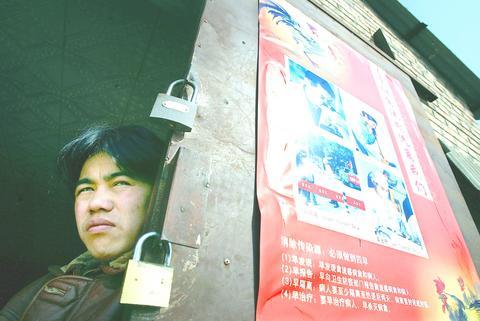Bird flu has savaged China's multibillion dollar poultry industry and if not brought under control soon threatens to wipe out the entire sector, leaving millions of farmers without income, analysts say.
As countries have slapped bans on China's poultry shipments, the impact has spread across the whole industry, with some officials estimating losses at more than 100 billion yuan (US$12 billion).

PHOTO: REUTERS
Supermarkets and fastfood chain sales have slumped, processors have warned of losses and potential layoffs and millions of impoverished small farmers are losing a valuable source of income as their birds are slaughtered.
"The fallout of the bird flu is disastrous and it will take at least half a year for China to return to its 2002 level of exports even if the virus is put under control immediately," warned Lin Xiangjin, agricultural research fellow with the Chinese Academy of Social Sciences.
China's poultry industry was worth around 242 billion yuan last year, official statistics show.
It is the world's fifth largest exporter and shipped out poultry products worth some US$900 million in 2002, according to the UN's Food and Agriculture Organization.
"The [poultry] sector was basically unscathed by the SARS outbreak last year, but it's seems to be our turn this time with the bird flu attack," said Gong Guifeng, an official at China Association of Animal Husbandry (CAAH).
"The knock-on effects have already started to spread across the whole poultry supply chain. Poultry suppliers, feedstuff producers and chicken farms have all been devastated," Gong said.
Chen Xiwen, deputy director with the government's Central Financial Work Leading Group, added that the damage was only likely to get worse.
Although millions of farmers across China raise poultry on a small scale to supply local markets, the main farming and processing bases are concentrated in five provinces -- Shandong, Guangdong, Liaoning, Jilin and Sichuan.
The CAAH estimates major producers such as Dalian Hanwei Group, Wen's Group, and Huadu Roiler Corp, are each posting monthly losses of over 100 million yuan, and will be forced to shutter production if the virus continues unchecked.
Huadu spokesman Chen Yuanfeng said the company's chicken exports, which normally run at 700 tonnes per month, have crashed to zero and the firm is considering laying off workers in an effort to cut expenses.
In the meantime, listed poultry breeders and suppliers, including ST Shenzhen Kondarl (Group) Co, Daying Modern Agriculture Co Ltd and Inner Mongolia Prairie XingFa Co have all warned of the impact of the outbreak on profits.
"We have definitely been hit by the virus, but it is difficult to quantify the impact at the present stage," ST Shenzhen Kondarl official Zhang Minghua said.
Mainland feedstuff producers, such as Sichuan New Hope Agribusiness Co, have also been mauled by decreasing demand for their products in China and key overseas markets.
In China, where urban consumers are becoming increasingly wary of buying raw chicken or even cooked chicken, domestic poultry sales have also fallen, with sales in some areas plunging by as much as 60 percent, Gong said.

The US dollar was trading at NT$29.7 at 10am today on the Taipei Foreign Exchange, as the New Taiwan dollar gained NT$1.364 from the previous close last week. The NT dollar continued to rise today, after surging 3.07 percent on Friday. After opening at NT$30.91, the NT dollar gained more than NT$1 in just 15 minutes, briefly passing the NT$30 mark. Before the US Department of the Treasury's semi-annual currency report came out, expectations that the NT dollar would keep rising were already building. The NT dollar on Friday closed at NT$31.064, up by NT$0.953 — a 3.07 percent single-day gain. Today,

‘SHORT TERM’: The local currency would likely remain strong in the near term, driven by anticipated US trade pressure, capital inflows and expectations of a US Fed rate cut The US dollar is expected to fall below NT$30 in the near term, as traders anticipate increased pressure from Washington for Taiwan to allow the New Taiwan dollar to appreciate, Cathay United Bank (國泰世華銀行) chief economist Lin Chi-chao (林啟超) said. Following a sharp drop in the greenback against the NT dollar on Friday, Lin told the Central News Agency that the local currency is likely to remain strong in the short term, driven in part by market psychology surrounding anticipated US policy pressure. On Friday, the US dollar fell NT$0.953, or 3.07 percent, closing at NT$31.064 — its lowest level since Jan.

The New Taiwan dollar and Taiwanese stocks surged on signs that trade tensions between the world’s top two economies might start easing and as US tech earnings boosted the outlook of the nation’s semiconductor exports. The NT dollar strengthened as much as 3.8 percent versus the US dollar to 30.815, the biggest intraday gain since January 2011, closing at NT$31.064. The benchmark TAIEX jumped 2.73 percent to outperform the region’s equity gauges. Outlook for global trade improved after China said it is assessing possible trade talks with the US, providing a boost for the nation’s currency and shares. As the NT dollar

The Financial Supervisory Commission (FSC) yesterday met with some of the nation’s largest insurance companies as a skyrocketing New Taiwan dollar piles pressure on their hundreds of billions of dollars in US bond investments. The commission has asked some life insurance firms, among the biggest Asian holders of US debt, to discuss how the rapidly strengthening NT dollar has impacted their operations, people familiar with the matter said. The meeting took place as the NT dollar jumped as much as 5 percent yesterday, its biggest intraday gain in more than three decades. The local currency surged as exporters rushed to